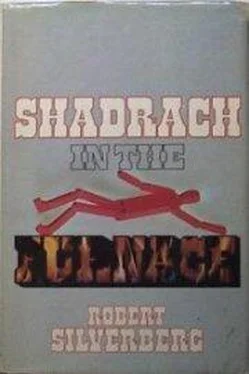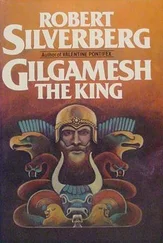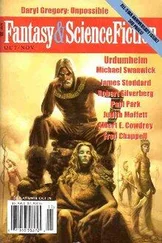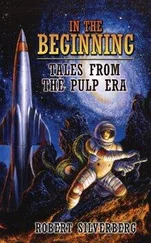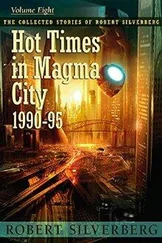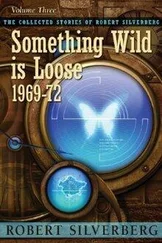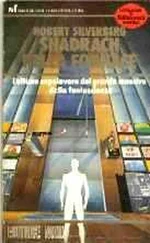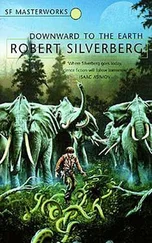Alone in his office, ruminating over his medical treasures, his books and old instruments and now this bit of bottled aorta, Shadrach feels safe and comfortably entrenched. This Avatar disturbance will blow over. The Khan, after all, is conservative; he will cling to his own Mongol body, the well-loved and sturdy patchwork carcass, as long as he can, whatever the temptations may be for him to jump into Shadrach’s strong, young, and vital frame. So there will be no precipitous exit for Shadrach, and in the months or perhaps years ahead he can try to shift the Khan’s fantasies entirely away from Project Avatar and toward Project Talos. Which will mean aborting the researches of Nikki Crowfoot, but Shadrach can’t feel too guilty about that, all things considered.
He gives the aorta pride of place on his shelves. Centuries from now it may be sacred, enshrined in a reliquary of ivory and platinum, and the groveling faithful will chant thanks to the sainted Shadrach Mordecai for having saved for posterity this shred of divine meat. Who knows? There is an apocryphal story that many of Genghis Mao’s original organs are preserved in some labyrinthine secret tunnel, kept in cold storage or perhaps maintained in vivo, for eventual use in cloning the Khan. Shadrach doubts this. If Genghis Mao had any serious interest in being cloned, huge budgetary appropriations would be going to support tissue-culture research, and, so far as Shadrach knows, not much is going on in that area. Or, more likely, there would already be a battalion of genetically perfect duplicates of Genghis Mao lying in suspension tanks on five or six continents, waiting to be summoned into life.
Mordecai has often thought of writing a scientific monograph on his patient, a medical biography of Genghis Mao, a full record of the myriad transplants and implants, the infinity of surgical jugglements, that are responsible for the Khan’s longevity and perhaps for his terrifying vitality. There would be nothing in the literature to compare with it, not even Beaumont on Alexis St. Martin’s digestive tract, not even Lord Moran on Churchill: had ever there been so single-minded and long-sustained a medical effort, spanning so many decades, to keep one human being alive and well? Already the achievement verges on the miraculous, but the real miracles stilllie ahead, as Genghis Mao, ageless and eternally renewed, lives on to be a hundred, a hundred ten, a hundred twenty. There is another, greater temptation — to write not merely a medical study but a full-scale account of Genghis Mao’s life. No biography of the Chairman exists, other than vague, sanitized publicity pamphlets, mere recitals of his political accomplishments and other exterior events, avoiding all details of his private life. It is as though the Khan has a superstitious fear of having his soul captured on paper. And so Shadrach’s impulsive fantasy: to nail the Khan in words, to pin him down with literary juju: It is one means of gaining control over the world’s most powerful man, at least in a metaphorical way.
The trouble is, no source material is available. The computer banks of Ulan Bator are gorged with intimate data about every human being alive — except Genghis Mao. Press the right button and platoons of facts march forth — but none about Genghis Mao. The facts of his life are unknown and may be unknowable, beyond the most elementary public milestones, his promulgation of the philosophy of centripetal depolarization, his founding of the PRC, his election to the Chairmanship. All the rest has been suppressed, even obliterated. When was he bom? In what obscure village? What was his childhood like, what were his boyhood ambitions? What was his original name, in the old People’s Republic days before he proclaimed himself to be Genghis Mao? What was the early course of his career? What sort of education did he have? Did he ever travel abroad? Was he ever married? A father? Yes, that’s a good question — are there, somewhere in Mongolia, middle-aged men and women who are in fact the blood children of Genghis Mao, and, if so, do they know who their father is? No one can answer these questions. No one can answer any questions about Genghis Mao except with hearsay, apocrypha, and myth. He has very carefully covered his traces, so carefully that the utter success of the attempt at total concealment argues a kind of madness.
But is anyone, even Genghis Mao, really willing to expunge from the world all traces of his private self? Criminals are said to return compulsively to the scene of the crime; possibly those who seek to shroud themselves in mystery tend also to undo their own mystifications by burying, for history’s sake, a full account of all they have tried to hide. Is there no place where Genghis Mao has secreted a concealed record of everything he has kept from the knowledge of his subjects? Say, a diary, an intimate and revealing diary, a repository for the essence of Genghis Mao’s masked soul. Shadrach imagines himself stumbling across such a document among the Khan’s effects — a single billion-bit bubble-chip, smaller than a fingertip, on which is implanted the raw red stuff of Genghis Mao’s life, his confessions, his unvarnished memoirs, out of which the faithful doctor Shadrach Mordecai will construct the first and only true account of the strange and sinister man who came to dominate the dying civilization of the early twenty-first century.
Of course there is no such diary. Ordinary thieves and felons may compulsively jeopardize their own safety, but Shadrach knows Genghis Mao well enough to realize that if he wants to live in secrecy, he will leave no hidden memoirs around for others to find. The private Genghis Mao is just as secretive as the public one: open one empty box and another, even more empty, lies within. No matter. In his fantasy role as the biographer of Genghis Mao, Shadrach will fantasize the Khan’s memoirs as well, inventing the source material that Genghis Mao has neglected to provide. He closes his eyes. He lets his imagination slip free of the leash. Recreates the diary of the Khan within the crucible of his own throbbing brain.
November 11, 2010.
My birthday. Genghis Mao is eighty-five today. No. No. Genghis Mao is — what — twenty years old? About that. It’s Dashiyin Choijamste who is eighty-five today. Dashiyin Choijamste, whom I carry about within me like an internal twin. Who remembers him, that fat little babe in his proud father’s arms? So long ago, in the village of Dalan-Dzadagad on a snowy night in 1925. That’s down in the province of Southern Gobi, Dalan-Dzadagad. I haven’t been there in fifteen years. My birthplace, but who knows that? Who knows anything? I know. Dashiyin Choijamste is eighty-five today. How many others are still alive, of those born on 11 November 1925? Not many, no. And those who remain are ancient doddering wrecks. Whereas I am still in my prime, I Dashiyin Choijamste of Dalan-Dzadagad, son of Yumihaghiyin Choijamste, director of the camel-breeding station at Bogdo-Goom. I Genghis Mao. I feel strong today, oh, yes, eighty-five and robust. Not altogether because of the transplants, either. It’s heredity that does it. The good old Tatar blood. Don’t forget, you were almost seventy when the Virus War broke out, and yet not at all old, tremendous vigor, all your teeth, jet-black hair, twenty-kilometer hikes every week; you hadn’t had any transplants yet. You were still Dashiyin Choijamste then. Strange syllables, awkward now on the tongue, though that was your name for more than six decades. And I lived right through the Virus War untouched by the rot. People fell apart all around me. Sickening to behold. I didn’t go in for transplants until later, much later, natural ravages of time, eventually, but not until after the power had come to me. The power. I have attained the highest power. And now clever doctors aid my natural Tatar vigor. I might live another fifty years.
Читать дальше
